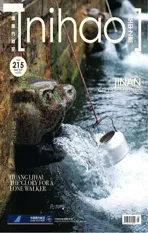一城山色,半城湖
2017-04-26
一城山色,半城湖
济南人的一天从一壶泉水开始。用泉水泡开一壶好茶,用泉水煮饭洗衣,在袅袅炊烟里看时光缓慢流逝。
Jinan people start their day with a nice cup of tea made from spring water. When dusk arrives, they gather along the springs and do their laundry and cooking while chatting with each other. Days gradually melt into nights, sinking into the ever gushing spring that feeds the entire city.

《画中游》(摄影:徐金利)Voyage in a Painting (Photo by Xu Jinli)

Snowflakes-like willow catkins fall upon the Hundred Flower Pond every April四月的柳絮似雪花般纷飞,为百花洲换上纯白春装

Sons and Daughters of the Yellow River (Photo by Huang Haihong)《映日黄河》(摄影:王海虹)
There are more than 800 fresh water springs in Jinan, every one of them bursting ceaselessly into the rivers and lakes. Therefore, the city has been named the “City of Springs”. Qing Dynasty scholar Liu E described Jinan in his poem: “All families have their own share of the spring outside their door, and all households have a willow right in front of their gate.”
The springs have given Jinan a touch of tenderness. Unlike most provincial capitals in China, Jinan is surprisingly slow-paced. The locals like to spend their free time playing chess while drinking by the river or fly a kite at the Spring City Square. Time seems to slow down here.
As an ancient city with around 2,600 years of history, Jinan is a fair representative of Longshan civilization– a part of China's prehistoric culture. Jinan has maintained the ancient Qi Dynasty Great Wall. Its great cultural environment has also attracted many famous scholars and poets to travel or even settle here, such as philosopher Mo-tse and female poet Li Qingzhao.
Walking along the old streets in Jinan, you can have a full taste of its long history. Take Qushuiting Street for example, it used to be where the literati gathered to drink. They would sit either side a narrow channel, and then one of them would pour a cup of wine and place it on a tray and let it drift on the water. Whoever the tray stopped in front of had to down the wine then compose a poem extemporaneously.
Over the years, Jinan has developed culturally as well as economically. The year 1904 saw its great changes when the city opened up as a trading port at the start of Qing Dynasty. It was when a lot of renowned trading names came into being. Most of those the shops remain prosperous even until now; standing next to the contemporary western buildings, they jointly tell a story of the hundredyear-long history of Jinan.
济南素有“泉城”之称,城内800多个泉眼日夜喷涌不息,无论春夏秋冬,泉水终年保持在18摄氏度左右,甘甜爽口。清朝刘鹗在《老残游记》中如是描述济南给他留下的印象:“家家泉水,户户垂杨。”
泉水造就了济南温润的气质,这座北方的城市温和得如同江浙一带的南方城市。作为山东的省会城市,济南的生活节奏却很慢很慢。在济南,到趵突泉茶社品茗赏泉,到大明湖泛舟阅荷,或者到泉城广场放风筝,一天的生活就这么过去。
这是一座拥有2600多年历史的古城。济南位于春秋时期齐国与鲁国的交界地,融合了尚变通的齐文化和重传统的鲁文化。她是中国史前文化——龙山文化的发祥地,有唐代四大古刹之一的灵岩寺,保存着中国最古老的齐长城遗址。济南还诞生过许多文化名人,墨子、扁鹊、李清照、辛弃疾……都从济南走出去,济南的文化和风光还吸引了无数的文人雅客来此生活游历,赵孟頫留下了《鹊华秋色图》,老舍写下《济南的春天》。
穿行在济南的旧街老巷,迎面而来的是充满历史与文化的旧时官址和青石板街道。其中,曲水亭街的名字格外富有文化味道。每逢农历三月初三,旧时济南的文人墨客齐聚于此街水亭边,将满上的酒觞放在托盘顺流而下,托盘停在谁人的位置,此人就得拿起酒杯一饮而尽,并吟诗一首。《兰亭集序》里“流觞曲水,列坐其次”的传统在这条街一直流传至清朝,这条街便以此为名。
深厚的文化传统让济南人尊敬文化。济南人喜欢叫别人“老师”,坐计程车、买菜、搭电梯、请路人拍照,“谢谢老师”的声音不绝于耳。孔子曰:三人行,必有我师焉。济南,是此句的真实写照。
传统的济南文化在1904年有了新的变化,那一年济南开商阜,从此这座老城拥抱现代文明,中西文化在这里交融。到清末民初,济南商阜已初具规模,商阜区四通八达,一大批著名商号应运而生。“瑞蚨祥”“宏济堂”“阜成信花行”……百年商号今犹在,只是朱颜改。沿着商阜新区的经二路由东向西,原德国驻济南领事馆、各商号门店在这片结合传统济南与西方近代风格的建筑区静静伫立,向人们述说近代济南一百多年来的发展。岁月荏苒,经历过百年开埠历史的济南,伴随着济南政府新印发的十大千亿产业振兴计划,又在新征途上迎接新挑战。
正如这座城市的泉水喷流不息,济南城每天都在上演不同的精彩。青青的柳条拂过清泉流水,生活不曾留止。

"Youxuan", an onionflavoured crispy snack葱香四溢、外酥内嫩的山东名小吃“油镟”

Laundry by the spring泉水洗衣

An old man reading in a hutong胡同里看书的老人
